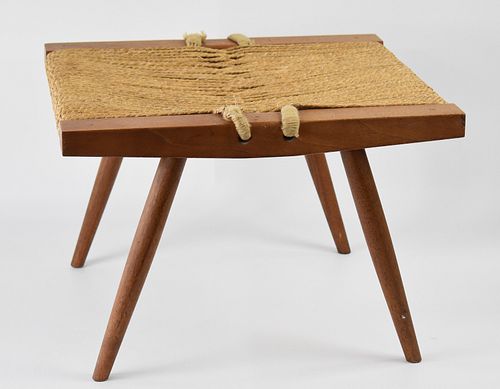GEORGE NAKASHIMA GRASS-SEATED STOOL
Bid Increments
| Price | Bid Increment |
|---|---|
| $0 | $5 |
| $50 | $10 |
| $200 | $25 |
| $500 | $50 |
| $1,000 | $100 |
| $5,000 | $250 |
| $10,000 | $500 |
Grass-seated stool signed by listed Northwest artist, George Nakashima. An iconic Nakashima design from the 1960s in walnut with grass cord seats, pegged joinery & turned splayed legs. This piece was purchased directly from the showroom floor in 1963. In this design, Nakashima has blended the Japanese tea ceremony, American Shaker furniture, and the Zen Buddhist ideals of beauty. Measures 12.5" x 18" x 16."
Available payment options
PICK-UP HOURS Monday-Friday 9am-4pm and the first Saturday following the auction from 10am -3 pm. Sundays & all other Saturdays: by appointment only. Winnings must be retrieved within 14 days or they will be considered abandoned and forfeited without refund. If you need to send someone else to claim your winnings, please call ahead and let us know!
WE SHIP! If you live further than 4 hours driving distance from McLaren Auction Services, we will automatically assume you require shipment of your auction winnings. Your credit card will automatically be charged for postage once the actual costs have been calculated. Shipments will be processed within the 14 day pick up window and a tracking number sent to your email. Please call or email immediately if you do NOT require shipping and plan on picking up in-person or sending someone else to collect.
McLaren Auction does NOT provide shipping services for over-sized items. Please call for questions/comments 503-678-2441. Happy bidding and THANK YOU!
AMERICAN, 1905-1990
A master woodworker and M.I.T.-trained architect, George Nakashima was the leading light of the American Studio furniture movement. Along with Wharton Esherick, Sam Maloof and Wendell Castle, Nakashima was an artisan who disdained industrial methods and materials in favor of a personal, craft-based approach to the design. What sets Nakashima apart is the poetic style of his work, his reverence for wood and the belief that his furniture could evince — as he put it in the title of his 1981 memoir — The Soul of a Tree.
Born in Spokane, Washington, to Japanese immigrants, Nakashima traveled widely after college, working and studying in Paris, Japan and India, and at every stop he absorbed both modernist and traditional design influences. The turning point in Nakashima’s career development came in the United States in 1942, when he was placed in an internment camp for Asian-Americans in Idaho. There, Nakashima met a master woodcarver who tutored him in Japanese crafting techniques. A former employer won Nakashima’s release and brought him to bucolic New Hope, Pennsylvania, where Nakashima set up a studio and worked for the rest of his life.
Nakashima’s singular aesthetic is best captured in his custom-made tables and benches — pieces that show off the grain, burls and whorls in a plank of wood. He left the “free edge,” or natural contour, of the slab un-planed, and reinforced fissures in the wood with “butterfly” joints. Almost all Nakashima seating pieces have smooth, milled edges. Nakashima also contracted with large-scale manufacturers to produce carefully supervised editions of his designs. Knoll has offered his Straight chair — a modern take on the spindle-backed Windsor chair — since 1946; the now-defunct firm Widdicomb-Mueller issued the Shaker-inspired Origins collection in the 1950s.
Nelson Rockefeller in 1973 gave Nakashima his single largest commission: a 200-piece suite for his suburban New York estate. Today, Nakashima furniture is collected by both the staid and the fashionable: his work sits in the collections of the Philadelphia Museum of Art, New York’s Metropolitan Museum of Art and the Smithsonian Institution, as well as in the homes of Steven Spielberg, Brad Pitt, Diane von Furstenberg and the late Steve Jobs.













